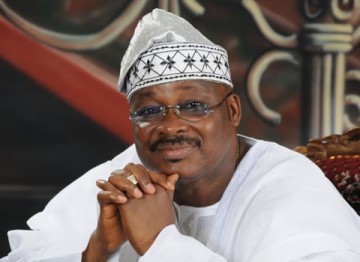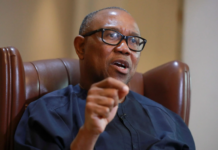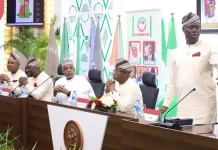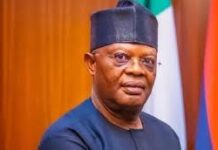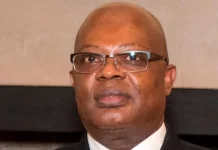Oyo State headed for a historic governorship ballot on Saturday with voters hoping to replicate the federal ballot on March 28 which upturned the status quo.

Since 1999, no governor has served a second term in the hotbed of South West politics. But that is likely to be consigned to history. An incumbent is in the race alongside two of his predecessors, any of whom could get the job.
The governorship vote nationwide marked a watershed in the political life of the South West, against the background of the victory of All Progressives Congress (APC) presidential candidate, Muhammadu Buhari, in the vote on March 28.
Buhari’s triumph is an unprecedented paradigm shift in the national political equation.
South Westerners have always been in opposition since independence, with collateral impairment of the fortunes of the region.
Major contenders
Among the six contenders for Government House, Ibadan are Oyo State Governor, Abiola Ajimobi (APC), former Governors Rashidi Ladoja (Accord Party), Adebayo Alao-Akala (Labour Party, LP), and former Senate Leader, Teslim Folarin (Peoples Democratic Party, PDP).
The popular saying is that no governor gets a second term in Oyo State.
However, judging by the result of the National Assembly (NASS) election on March 28, neither Ladoja nor Alao-Akala can be easily wished away in the race to take over Ajimobi’s job. The jinx is broken once one of the three men wins.
The NASS election produced the three senators for the APC and 12 of the 14 House of Representative members.
Though beaten, Ladoja and Alao-Akala have been displaying bravery since then. But can either of them spring a surprise? Or will it be Folarin?
In 2011, Ajimobi, then in the defunct Action Congress of Nigeria (ACN), polled 420,852 votes to dislodge the then incumbent Alao-Akala (PDP), who scored 387,132 Ladoja scored 275,773 votes.
Alao-Akala
The administration of Alao-Akala (2007 to 2011) was associated with thuggery and violence. It was also a profligate government which undertook many projects that were poorly executed due to a lack of commitment to quality and alleged kickbacks by public officials.
The crisis that rocked PDP grew sharply during his tenure so much so that many of its stalwarts, particularly in Ibadan zone, worked against Alao-Akala’s re-election.
Besides, the wave of change represented by the then ACN was blowing through Ekiti and Osun States where PDP governors were removed by the Court of Appeal for ACN governors.
Alao-Akala was generous to those around him, which helped him retain many people who patronise political power and its privileges.
Ladoja
But in the growing discontent against Alao-Akala’s government, Ladoja (who governed between 2003 and 2007), began to make waves again, rendering the political turf more complex.
Ladoja defected from the PDP to Accord and grew the party before the governorship ballot on April 26, 2011.
However, the wave of change in the South West and Ajimobi’s popularity combined to earn him victory in 2011, trouncing Alao-Akala to second position with 33,720 votes.
Four years ago, Ajimobi beat Alao-Akala in Ibadan and Oyo zones with a wide margin and gave him a very close marking in Oke-Ogun where he polled 96,667 to Alao-Akala’s 97,398. Ladoja came a distant third with 275,773 votes.
As tough as it was, Ajimobi dislodged Alao-Akala, an incumbent whose party was controlling the federal government.
The three parties produced seven, 13, and 12 members respectively in the state House of Assembly. They also produced members of both Chambers of the NASS, except Accord which had no senator.
But Accord went to the election on March 28, 2015 with one Senator, Olufemi Lanlehin, who defected from the ACN.
Dynamics changed
The dynamics have changed in the past four years. Because human beings and society are not static, politicians have crisscrossed parties to find better comfort and advantage in realising their personal ambition.
New issues have also reshaped the polity to alter voting patterns and voter interest.
It is, therefore, no surprise that in the federal ballot on March 28, 2015, the APC rose from zero to produce all the state’s three senators, and 12 of the 14 members of the House of Representatives.
Aside keeping its lead in its traditional zones of Ibadan and Oyo, the APC gained more popularity in Oke-Ogun and Ibarapa where Alao-Akala came tops four years ago.
The APC made inroads in Oke-Ogun and Ibarapa, and its popularity increased in Ogbomoso, Alao-Akala’s home town.
State APC Chairman, Akin Oke, attributed the gains to the unprecedented performance of Ajimobi in the past four years.
He said Ajimobi implemented projects and improved the standard of living in the five zones in the state – citing, among others, the dualisation of roads in Ibadan, Oyo, Ogbomoso, and Iseyin (Oke-Ogun).
Counter views
But the Director General of the Rashidi Ladoja Campaign Organisation, Adeolu Adeleke, alleged that the election on March 28 was rigged in favour of the APC.
PDP Publicity Secretary, Kehinde Salawu, attributed APC’s victory to the popularity of Buhari. He said the governorship vote would be different.
Alao-Akala, speaking through his spokesman, Oludare Ogunlana, also attributed APC’s performance in the election to the popularity of Buhari. He said most voters are illiterate who could not differentiate between presidential and NASS elections.
Confidence all round
All the major parties approached the governorship election with confidence, in the belief that the tide would turn in their favour. They stepped up personal campaigns.
Folarin insisted that voters would choose him because “we have educated our people to vote right this time because a governorship election is crucial in any state because it is closer to the people. And we believe we will do wonderfully well.”
He spoke through state PDP Publicity Secretary, Kehinde Salawu.
Alao-Akala also maintained that he would gain votes to return to Government House because the people are tired of the Ajimobi administration.
But Oke said it is clear that voters are very pleased with the transformation, restoration and the repositioning agenda of the Ajimobi administration as shown in the results of the federal election.
Oyo savours new mood
Never in the history of the South West has its party of choice won at the federal level. Oyo State was among the states that rejected President Goodluck Jonathan of the PDP.
Buhari polled 528,620 votes in the state against Jonathan’s 303,376 votes, margin of 225,244.
The APC’s victory at the centre may play a key role in putting Ajimobi ahead of other candidates because a lot of voters would reason that the state deserves to enjoy the privileges of having a progressive party control Abuja.
Besides, Oyo State has always been home to the progressives, except in 2003 and 2007 when it is generally believed that the PDP rigged to take over the South West. It partly explained why Ajimobi defeated Alao-Akala in 2011.
Second, Ajimobi’s performance in the past four years is unparalleled. He has changed the face and the name of the state through urban renewal, environmental sanitation, integrity, welfare for civil servants, and infrastructure development.
His footprints are visible in major towns.
Third, the result of the NASS election punctured the assumption that Accord was next in strength to the APC in the state, and that it might upstage the former.
The APC won three senatorial seats and 12 of 14 House of Representatives seats, Accord did not win a single seat. Only the PDP and LP won one seat each, and both are in Ogbomoso.
With a total 357,017 votes in the Senate and 349,618 in the House of Representatives garnered on March 28, the APC may easily overrun the other parties in the governorship.
Accord, which came second overall on March 28, scored 213,151 votes in the Senate race and 171,675 in the quest for the House of Representatives. Its total 384,826 is about 53 per cent of APC’s 706,635.
The PDP came third with a total 325,251 votes, less than half of the APC’s.
With this result, the majority of voters are likely to see other parties as weak while seeing the APC as strong. Already, some members of Accord in Ibadan North East Council have defected to the APC.
LP may not record another landslide victory in Ogbomoso as it did in 2011 because of Alao-Akala’s defection from the PDP.
As shown in the March 28 poll, voters in Ogbomoso are divided into LP, PDP, and APC – with the profile of the APC rising sharply in the past four years.
The result showed that both Alao-Akala and Ladoja, who were considered very strong contenders before the vote on March 28, no longer possess electoral strength.
The APC defeated Ladoja in his Ibadan North Council. Alao-Akala was unable to win all the seats in Ogbomoso or additional seats in Oke-Ogun as he did in 2011.
Advantage Ajimobi
Fourth, with three APC senators and 12 House of Representatives members mobilising support across all the zones, performance in office, combined with the power of incumbency, Ajimobi is most favoured to break the second-term jinx.
He is also projected to be ahead going by the result of the NASS election and the projects he executed, including granting autonomy to two tertiary institutions in Ogbomoso zone.
Judging by the results of the federal election and the fact that Ogbomosho is traditionally progressive inclined, Ajimobi is equally on pole to win the area.
Alao-Akala, who hails from Ogbomoso, should have a clear lead in the zone. But Ajimobi and Folarin are expected to follow him closely. This is because his defection from the PDP has broken his grip on the area.
The deputy governorship candidate of the PDP hails from Ogbomoso while an APC senator has emerged from the town. All these would combine to split the vote for Alao-Aka in the zone.
Ibadan zone is a loose ground for the four major parties, but Ajimobi is projected to lead given the results in 2011 and the federal election on March 28 this year. He is likely to be followed by Ladoja, who is popular in some of Ibadan councils.
The PDP, LP, Accord, and the Social Democratic Party (SDP) all adopted Jonathan for the presidential vote on March 28, which he failed to win.
Therefore, the ripple effects of the victory of the APC in that election may include a historic win for Ajimobi, based on his performance in office.

